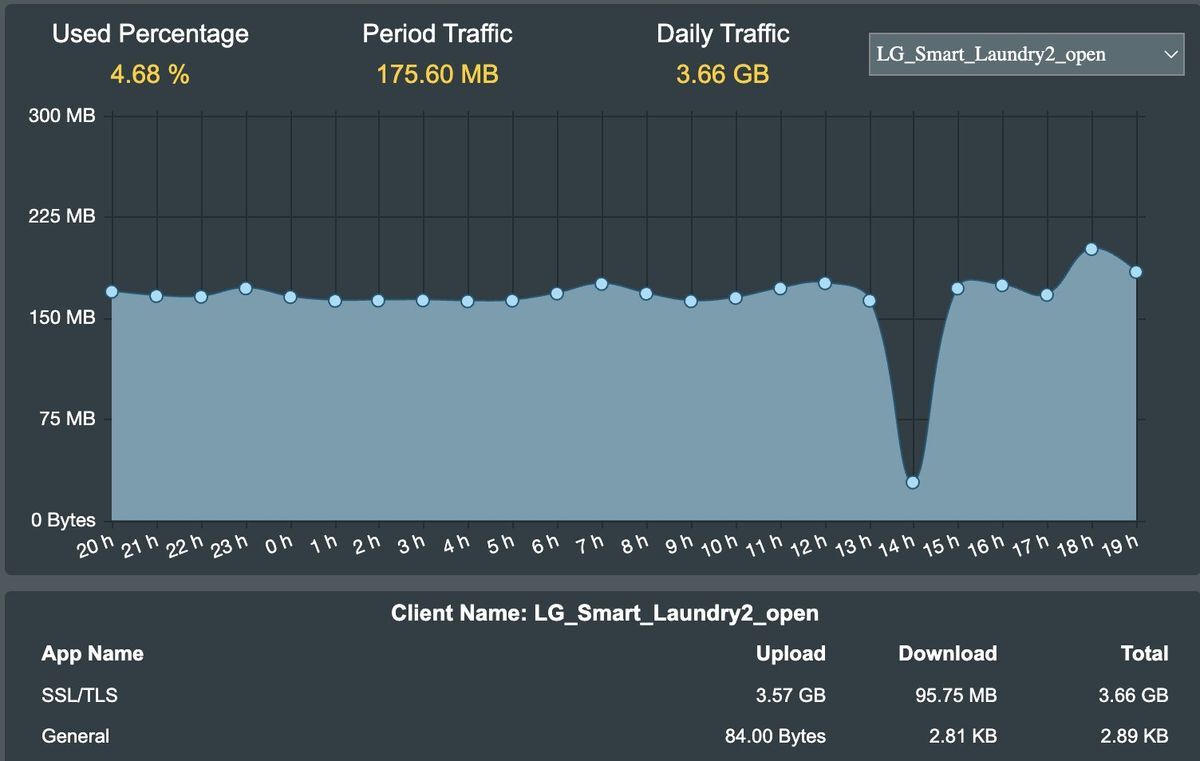Clickbait, he tweeted “inaccuracy in the ASUS router tool” later on.
In a follow-up post a day after his initial Tweet, Johnie noted “inaccuracy in the ASUS router tool,” with regard to Apple iMessage data use. Other LG smart washing machine users showed device data use from their router UIs. It turns out that these appliances more typically use less than 1MB per day.
the writer knew that the stats were bunk, yet wrote the article anyway. the site knew this, too, tacked-on the clickbait headline and published it. toms really has gone to shit the last few years–at least under the current ownership (last changed hands 2018).
Speaking of which, it uses the same web interface as a lot of other news sites. Newsletter popup, autoplay video part-way down that then jumps to the top of the screen, etc. What Hifi is the same, and there are various other sites all with the same annoying engine. Two questions: (1) are all these sites owned by the same company and (2) is there a browser extension that can fix them?
yes, it’s the same ownership (scroll down to the bottom). they have dozens of sites. don’t know of any specific addons to help with them, though. custom ublock origin rules, perhaps.
This is happening with streaming apps too. Max and Prime look exactly the same. Either some UI engineer got hella contracts, a parent company tried to save on development, or both. Either way, theres something unnerving about your apps looking the same and just hosting different content.
And OP presumably read the article, knew there was no actual story, and posted it here anyway.
Thanks for saving me the click.
No it couldn’t. My washing machine cant connect to my network! I can’t think of a valid reason why I would even want that.
I tried it with our dish washer, just to see what it’s about. Turns out it’s all about nothing. It’s absolutely void of any useful functionality.
I can think of a very valid reason. I very often forget that I ran the washing machine, I’m already investigating how to send a notification to my phone or computer after it is done. Right now I am checking how much electricity it consumes and when it stops doing it. But a API would be nicer.
They sell clean/dirty indicator magnets for dishwashers for like $2.
stick a bell onto it and take a moment to listen whenever you want to check.
To wake the baby up?
On one hand, it would be nice for us to drop the smart plug here, but at least those can be entirely local-only. I highly doubt any device API would be local.
What about a NFC tag that starts a timer on your phone?
Yeah, I don’t get it. I guess I can see the appeal of some “Internet Of Things” connected appliances, like smart fridges suggesting recipes and keeping track of stock and auto-populating shopping lists for you. I don’t need that personally, but I can see why it could appeal to some people.
But things like washing machines and dishwashers? You need to be there in person to fill them up just before they’re ready to go on, and to empty them when they’re done. And when they’re not turned on, they’re sat there doing nothing. What “smart” functions can they even offer?
I guess I can see the appeal of some “Internet Of Things”
IoT, where the “S” stands for security…
Because it’s advertised. That’s why.
A remarkable (and actually concerning) percentage of people completely lack the critical thinking skills to question whether that’s a good idea. The box says it has WiFi, WiFi is good, so I connect it to WiFi. Simple as that.
Imagine spending extra money on a new clothes washer only to have someone turn it in to a crypto miner. 😬
I’m too lazy to come up with a witty money laundering joke.
IoT = bad
The ‘S’ in IoT stands for security
Internet of Targets
Why are people connecting their machines to wifi in the first place?
It’s starts with a sales pitch (not just to you, it’s sales pitches all the way down) about how the washer can send the user status, maybe let them schedule, etc. They probably have an app to pair with it to keep it all in-house. One thing leads to another, every appliance gets wifi and sends a ton of data to a totally undoubtedly secure and anonymous centralized server full of harmless data for the sake of saving the customer 15 steps.
Big Brother didn’t ride in on the back of a commie tank, he was invited in for the slightest increase of convenience.
I can understand wanting it on your local network. Being able to check remotely how much time is remaining. Getting alerts if it needs maintenance. In a big house with multiple family members all doing laundry, just checking to see if the machine is in use before hauling all your stuff down could be nice. But, that info doesn’t need to leave the house. I don’t know why you’d want that information leaving the house.
You know, I really like to know if my washing machine has finished when I am on vacation. /s
It tells them when the cycle is done. Which apparently a beep can’t do.
My machines are in a disconnected garage. There’s no hearing the beep. And the wash time varies due to load size, to the point that the estimate on the screen isn’t very accurate, so seeing a timer isn’t great either.
I have never bothered to connect them to wifi yet, though. But a phone notification would have is uses.
a kitchen timer or a timer on your phone will be close enough. set it for your own estimate based on experience when you get back in the house from stuffing a load in the washer.
That makes sense. My inlaws have theirs hooked to alexa and the machines are the next room over from their living room. Seems like a little over kill.
My smart appliances serve as nodes for Pied Piper’s new decentralized internet.
Shut up Jared
Until a robot can hang up my washing, my machine is staying off any networks
When it can you should still setup a private network just for them to communicate
Yep, one for private use, one for this kind of machines and one for guests. But still, in theory it could be sending sensitive data regardless of network setup.
Plot twist: it was the Asus router misreporting the amount of data.
LG’s app is an absolute privacy nightmare too. That app must be used if you want access to any smart appliance features and it requires precise location permissions 100% of the time. Even then, the app features are mediocre, it doesn’t work very well and often doesn’t notify of a finished wash load until long after it’s completed.
Why anyone would want to allow their washing machine manufacturer to continuously track their exact location in exchange for some crappy, poorly implemented features is beyond me.
Thanks for pointing out the location service thing. I just killed that shit.
A: Why would a washing machine have internet access? B: If it has the option, why would You even connect it to the internet? C: If it has to be connected to the internet, why would You even buy it?
At least regarding the last point: maybe because there was no other option.
If you need specific features or have certain space constraints, you may end up with only two or three devices.
As an example: try to find a TV (not a monitor, a real TV with tuner, etc) without WiFi. Almost impossible.
A: Why would a washing machine have internet access?
They can download customized wash cycles if you’re into that sort of thing. They can also communicate through an app to do things like tell you when a load of laundry is finished, when it’s time to run it through a self-cleaning cycle, and give specific details when it encounters problems (e.g., mine once notified me the hot water line was giving it cold water). They also allow you to start a cycle remotely, but tend to require enabling that manually via button press for some reason, so that feature’s basically useless.
I have a similar model washer/dryer and refuse to put it on my wifi. I only want it to wash and dry.
There are probably 3 main groups of people with WiFi appliances:
- The vast majority of people don’t care, and put it on their normal WiFi router and would never notice something like this
- A smaller group of people don’t care much, but pay attention to their bandwidth usage and would spot an appliance trying to send 3.7 GB of data a day
- A much smaller group of people are paranoid and would put the device on its own isolated subnet, or use firewall-type features to limit the access their appliances have to the Internet.
My guess is that if this were a widespread problem, people in the second group would notice, or would have immediately checked and chimed in and said “holy crap, mine is doing this too”. I didn’t hear many people saying that, so I’m guessing this is a bug, and it’s either a one-off weirdness, or it’s a bug related to people in group 3 who are blocking their appliances from being able to connect to the Internet.
It’s probably something as simple as a badly programmed firmware update check that doesn’t do exponential backoff when it fails. It probably connects, fails, then immediately tries again. A proper exponential backoff would wait before trying again, and if it failed again it would double the wait time down to some minimum value like once per day or something.
Incidentally, this is also why claims about smartphones monitoring people’s conversations when they’re supposedly off is BS. That would require either huge amounts of bandwidth to transmit all the conversations, or huge amounts of computing power inside the phone to decode the voices. Either way you’d be using tons of battery, and probably a significant amount of bandwidth. There are enough paranoid people out there that if this were a real thing, someone would have caught the devices doing it by now.
I think the largest group by far isn’t listed: people who bought an appliance and didn’t care at all that it had WiFi and never connected it their network.
“Error: Wi-Fi must be enabled and connected to load detergent.”
The article gets into what actually happened.
Dude’s Asus router was incorrectly reporting bandwidth usage.
Just put the device on a separate wifi without internet access, or look at the “child protection” features of your router. Ours can put devices based on their MAC into “access groups” which range from “full access” over "internet from \ to " to “no internet at all”.
The article mentions that his router is probably to blame.
deleted
Luckily, most embedded devices lack the smart to attach to two networks at the same time. So you keep it locked into a network where it can only do your bidding, and it won’t listen to anyone else. Unless they built in some very crazy and nefarious code and drive around with network enabled cars in the owners neighborhood.
deleted
Not everybody has the money for an extra router.
No need for an extra router. I just put those device into the “has no internet access” group. It is one of those “Parental Control” things. Every device inside the net can see and talk to it, but itself cannot talk to anything outside.
deleted
Until the router needs to be reset, or something else happens to it.
That’s what “configuration backups” are for. You’ve got some, don’t you?
deleted
Why a washing machine need the connect to the Internet in the first place?
So you can manually put your laundry inside it, go to your bed and tell the machine to wash it like you didn’t had to get up to put your laundry inside it.
Reporting when it finishes, allowing remote start, collecting statistics, downloading improved firmware to name few. None of these are essentials though.
Edit: uploading -> downloading
Tomorrow is my turn to post about this
Was it being used as a node in a botnet? Or did it glitch somehow to keep sending over and over again? I can’t image that behavior is nominal for that washing machine.


















